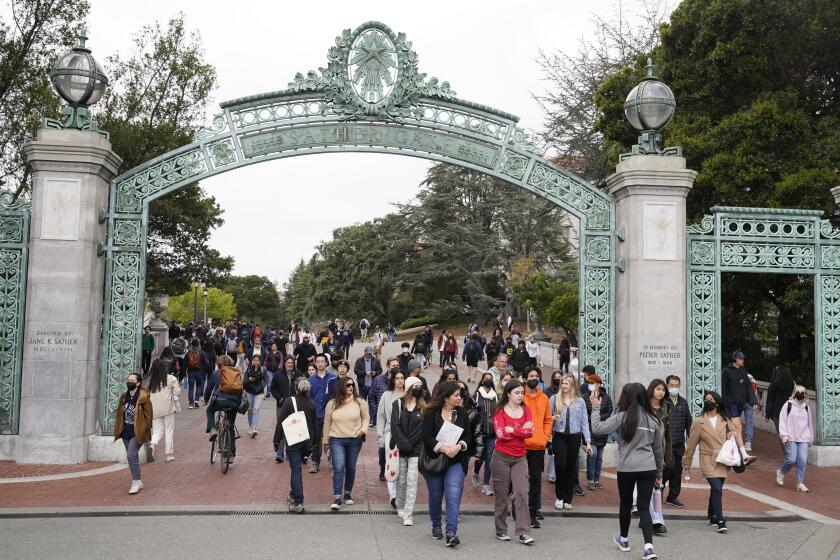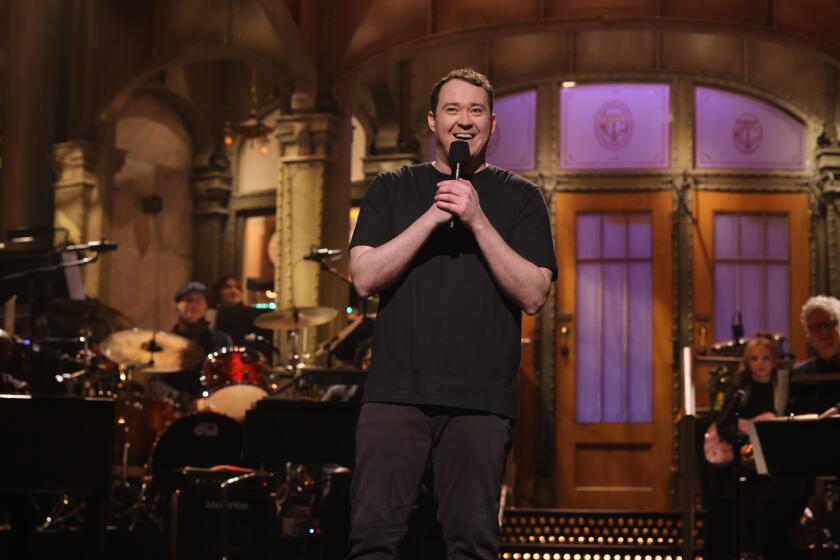Column: The boomer versus millennial grudge match is silly

At a recent family dinner, various younger relatives were talking about music streaming services and began to wonder aloud whether Pandora was still around. They, of course, use Spotify.
“Ask Mom,” said my 31-year-old millennial daughter.
“Yeah, Pandora is still around,” I said. “I use it all the time.”
Was their muffled laughter tinged with soupcon of condescension?
Listen, I was just grateful no one said, “OK Boomer.”
Certainly, we are on opposite sides of a generation gap. If I weren’t raising my 14-year-old niece, I would have no idea what “gyat” means, and would probably not know the lyrics to Paul Russell’s infectious “Lil Boo Thang.”
Objectively, I know I am aging.
But because I am a boomer, I can’t bring myself to say, “I am old.”
My father, who died three years ago at 91, was my model for what “old” looks like. He slowed down, but he never stopped, even when I wished he would. For example, by the time he turned 90, I thought he should relinquish the car keys. But he insisted that his macular degeneration was no impediment because driving was a matter of “muscle memory.”
A group of well-meaning Cal parents hired its own security force in response to crime around the storied UC campus. Is it helicopter parenting or common sense?
In so many ways, though, he defied the idea that generations can be stereotyped simply by dint of a birth year.
He was technically a member of the silent generation (1928-1945), but he was a college professor, always interacting with younger people, super political and anything but quiet. An early adopter of all kinds of technology, my dad had the first Mac, the first iPod, even the first Walkman in our family. He used BitTorrent to download movies, and he talked about “seeders” and “feeders.” He was delighted when he received a letter from the FBI warning him to stop using the Pirate Bay to illegally download movies or face legal consequences. “Oh yeah, like they’re really gonna put an old man like me away,” he scoffed.
And yet, as tech savvy as he could be, when he’d make a call on his iPhone, he would jab at the screen as if he were punching numbers into a push-button phone.
He and my mother produced four baby boomers, born between 1953 and 1960. And the four of us gave our parents six millennial grandchildren, born between 1981 and 2000.
I’ll take all the help I can get prying the smartphone out of my 13-year-old niece’s messy orange hands.
Do we conform to stereotypes about our generations? I don’t think so.
Our parents were working and/or distracted by the arrival of a more liberated, less strait-laced era than they’d come of age in. So my cohort of boomers essentially had free-range childhoods. When we were 11, my best friend and I secretly hitchhiked up PCH from Leo Carrillo State Park, where we were camping with her parents, to County Line Beach. By contrast, I rarely let my millennial daughter out of my sight until she was in high school. The thought of her climbing into a car with a stranger gives me a stomachache. (She assures me she never has.)
Boomers have promoted a caricature of millennials as having a weak work ethic, being emotionally fragile and spending too much money on avocado toast when they should be saving for a down payment on a house. But those are risible generalizations. Millennials have boundaries. They can talk about their feelings. We boomer parents taught them those things. And when you take into account today’s staggeringly high home prices, the shortage of affordable housing and the phenomenon of retiring boomers who don’t see a benefit to downsizing, which would free up more housing stock for younger families, the avocado toast fallacy is revealed for what it is: generation trashing.
Millennials and their slightly older forebears in Generation X (1965-1980) can indeed come off as embittered at times — angry about what they perceive as the shortcomings, entitlement and youth obsession of their parents’ — of my — generation.
Gillis, hired and fired by ‘SNL’ in 2019 for racist, sexist and homophobic remarks, excels at demonstrating how unfunny a slur can be.
“God forbid any generation younger than the boomers gets the spotlight once in a while,” wrote a user named ChemicalPrimary5775 on Reddit, my social media guilty pleasure. The comment was posted in a discussion group called “Boomers Being Fools,” which drips with generational antagonism.
“A lot of boomers are in a state of undiagnosed pre-dementia,” wrote WombatIsAngry, which actually made me LOL because yes, the oldest boomers are approaching 80, so that’s probably an accurate observation.
“Other than those who served in Vietnam,” wrote direwolf2368, boomers “experienced very little adversity. In short, they were people of privilege from the start & at a certain point saw no reason to pretend they were anything else.”
And don’t even get millennials started on tech-challenged boomer colleagues.
“Why are boomers so bad at using computers in the workplace, when they’re the generation that invented office software and have had far longer to use it than the rest of us?” wrote another Redditor.
When the pandemic hit, some millennials took to calling COVID-19 the “Boomer Remover.” That, wrote a Financial Times columnist, “may reflect the general lack of empathy in society these days, but it may also mirror the free-floating political anger that the current generation has for their elders.”
Isn’t the current generation always angry with their elders?
I mean, if you can’t blame your parents’ generation for the stuff that’s wrong with your life, are you even alive?
More to Read
A cure for the common opinion
Get thought-provoking perspectives with our weekly newsletter.
You may occasionally receive promotional content from the Los Angeles Times.















